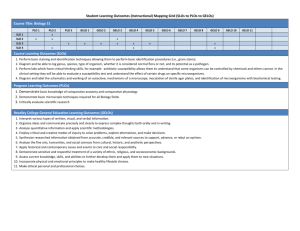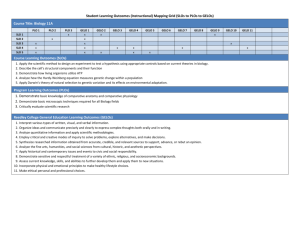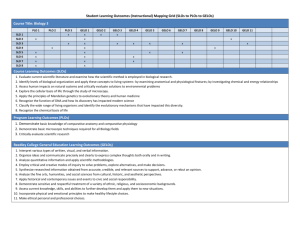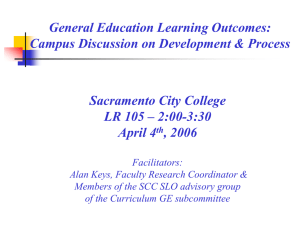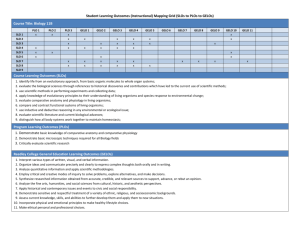Student Learning Outcome Advisory Group Meeting Minutes – 11/09/06 Attendees:
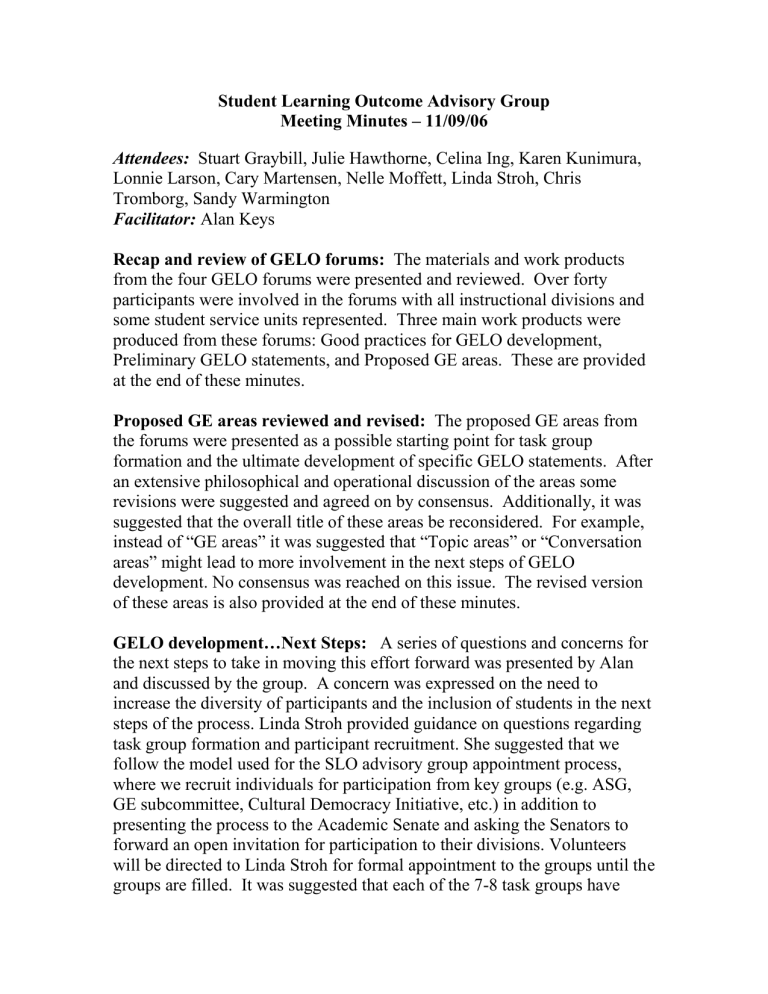
Student Learning Outcome Advisory Group
Meeting Minutes – 11/09/06
Attendees: Stuart Graybill, Julie Hawthorne, Celina Ing, Karen Kunimura,
Lonnie Larson, Cary Martensen, Nelle Moffett, Linda Stroh, Chris
Tromborg, Sandy Warmington
Facilitator: Alan Keys
Recap and review of GELO forums: The materials and work products from the four GELO forums were presented and reviewed. Over forty participants were involved in the forums with all instructional divisions and some student service units represented. Three main work products were produced from these forums: Good practices for GELO development,
Preliminary GELO statements, and Proposed GE areas. These are provided at the end of these minutes.
Proposed GE areas reviewed and revised: The proposed GE areas from the forums were presented as a possible starting point for task group formation and the ultimate development of specific GELO statements. After an extensive philosophical and operational discussion of the areas some revisions were suggested and agreed on by consensus. Additionally, it was suggested that the overall title of these areas be reconsidered. For example, instead of “GE areas” it was suggested that “Topic areas” or “Conversation areas” might lead to more involvement in the next steps of GELO development. No consensus was reached on this issue. The revised version of these areas is also provided at the end of these minutes.
GELO development…Next Steps: A series of questions and concerns for the next steps to take in moving this effort forward was presented by Alan and discussed by the group. A concern was expressed on the need to increase the diversity of participants and the inclusion of students in the next steps of the process. Linda Stroh provided guidance on questions regarding task group formation and participant recruitment. She suggested that we follow the model used for the SLO advisory group appointment process, where we recruit individuals for participation from key groups (e.g. ASG,
GE subcommittee, Cultural Democracy Initiative, etc.) in addition to presenting the process to the Academic Senate and asking the Senators to forward an open invitation for participation to their divisions. Volunteers will be directed to Linda Stroh for formal appointment to the groups until the groups are filled. It was suggested that each of the 7-8 task groups have
approximately 2-5 members in order to facilitate a productive yet manageable process.
The communication and “approval” process for all aspects of the
GELO development process was also discussed. Linda suggested that the newly revised areas along with the “task group” plan be presented to
Academic Senate at the Dec. 5 th meeting and then forwarded to Executive
Council as an FYI at their Dec. 6 th meeting.
Attachments:
1.
Good Practices for GELO development compiled from all
GELO forums – 2006
2.
Preliminary GELOs from Spring, ’06 GELO forum
3.
Compilation of proposed GE areas from the 3 fall, ’06 forums
4.
Revised list of areas from joint meeting of SLO advisory group, GE subcommittee, and Academic Senate President on
Nov. 16 th , 2006.
Attachment 1: Good Practices for GELO development compiled from all GELO forums – 2006
Good Practices for GE Learning Outcome
Development*
Keep process open and inclusive
Involve Students!
Engage all divisions
Plan for communication at all stages
Continue College-wide dialogue (before, during, & after development process)
Consider workload ramifications and explore funding options
Integrate (Embed) with existing course and/or program design when possible
Explore implementation issues in order to inform the
GELO development process
Develop connections between Student Services and
Instruction at all stages
*These points were generated from discussions held at the GELO forums (Spring-Fall, ’06)
Attachment 2: Preliminary GELOs from Spring, ’06 GELO forum
*** Important Note: The outcome ideas below are the product of preliminary brainstorming sessions of the participants at the first college-wide discussion of General Education Learning Outcome development.
They are meant to be used as a springboard for future discussions and a more formal development process to begin in Fall, 2006. Feel free to contact faculty research coordinator, Alan Keys
( keysa@scc.losrios.edu
, ext. 2941) for more information ***
“Upon graduation our students will be able to…”
Find, interpret, analyze, evaluate, apply, and present information
Demonstrate an understanding of and application of the scientific method
Demonstrate information competency in researching and locating information
Critically think and reason
Read and comprehend college level information
Express themselves and ideas in writing at a college level
Write a coherent essay, expository, argumentative (300 level)
Speak, express themselves clearly & accurately with attention to audience, organization, & word choice
Calculate and use numerical reasoning at the intermediate algebra level
Apply mathematical concepts
Comprehend and be knowledgeable about world around us: economy, politics, current social institutions, global issues
Compare and contrast cultural differences and contributions of different groups
Demonstrate understanding, awareness, & comfort with various cultures & differences among people
Demonstrate multicultural awareness and history
Demonstrate basic foreign language awareness
Demonstrate an appreciation of artistic expressions
Develop appreciation for aesthetics
Demonstrate effective study skills and lifelong learning preparation
Listen, comprehend, follow directions in various contexts
Demonstrate time management, goal setting, and determination and perseverance to reach goals
Use computers in daily lives and daily settings
Make informed career choices
Demonstrate a knowledge of healthy living skills
Demonstrate a coherent integrated sense of self and larger purpose
Develop need for ethical understanding and social responsibility
Develop a sense for the need to have physical health programs and nutrition
Attachment 3: Compilation of proposed GE areas from the 3 fall, ’06 forums
The proposed areas below have been compiled from preliminary brainstorming sessions that involved over forty participants from the
General Education Learning Outcome forums held from April-
November, ’06.
Members of the SLO advisory group, GE curriculum subcommittee, and Academic Senate leadership will discuss and refine these areas in order to present a proposal for GELO development to Academic
Senate and Executive Council in Fall, ‘06.
The final GE areas are meant to be used as a framework to guide the creation of GE learning outcomes via a collaborative “task group” process to begin in Fall, ’06 and continue through Spring, ’07.
I.
Communication Skills
Including oral, written, and non-verbal skills
II.
Critical thinking
Including logic and problem-solving ability
III.
Quantitative Reasoning
IV.
Breadth and Application of Knowledge
Including subdivisions to include all disciplines of study
V.
Living Skills
Including applied skills in a variety of areas, PE, mental health, and lifelong learning
VI.
Information Competency
Including technical competency
VII.
Cultural Competency
Including intercultural and global awareness and competency
VIII. Ethics
Attachment 4: Revised list of areas from joint meeting of SLO advisory group, GE subcommittee, and Academic Senate President on Nov. 16 th , 2006
*The areas below and subsequent GELOs developed in the future should be viewed as a “Living Document” and open for review and revision on a regular basis.*
1.
Communication
2.
Critical Thinking
3.
Quantitative Reasoning
4.
Depth and Breadth of Knowledge
5.
Life skills and Personal Development
6.
Information Competency
7.
Cultural Competency
8.
Ethics
![[Course information: prefix, number, title, credits] GENERAL EDUCATION COMPETENCY AREA:](http://s2.studylib.net/store/data/015759506_1-897e653fa9d8b4d146755dfb01d20713-300x300.png)
